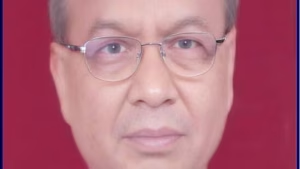New Delhi – In a shocking turn of events, the CJI Shoe Attack Update reveals that Chief Justice of India BR Gavai was targeted by a lawyer who attempted to hurl his shoe inside the Supreme Court premises on Monday. The accused, identified as 72-year-old lawyer Rakesh Kishore, was immediately detained and handed over to the Delhi Police.
The CJI Shoe Attack Update has sparked outrage across the nation, with many questioning how such a breach could occur inside India’s highest court. The incident unfolded at around 11:35 am in Court No. 1 during an active hearing session.
Attacker’s Bizarre Justification

According to the CJI Shoe Attack Update, Rakesh Kishore showed no remorse during interrogation. Instead, he claimed he acted after hearing the Chief Justice’s remarks on a plea concerning the restoration of Lord Vishnu’s idol in Khajuraho. Kishore stated that he “couldn’t sleep after that judgment,” claiming divine inspiration pushed him to act.
The CJI Shoe Attack Update cites Kishore’s statement to police: “The Almighty was asking me every night how I could rest after such an insult.” His emotional and spiritual justification has further stirred debate over the incident’s intent and implications.
Link to the Khajuraho Judgment


As detailed in the CJI Shoe Attack Update, Kishore’s anger stemmed from a Supreme Court bench declining to hear a plea seeking reconstruction and reinstallation of an idol at the Javari Temple, part of the Khajuraho temple complex. The Chief Justice had remarked that the issue fell under the Archaeological Survey of India’s jurisdiction and suggested, “Ask the deity to do something.”
The CJI Shoe Attack Update notes that these remarks triggered strong reactions among certain groups, which viewed them as insensitive. Kishore reportedly took them personally, claiming that the words “insulted the divine.”
Released Without Charges
The CJI Shoe Attack Update confirms that despite his attempted attack, Kishore was later released after the Supreme Court registry refused to press charges. This decision has drawn mixed reactions — while some commend the restraint, others believe such behaviour inside the court warrants stricter action.
As per the CJI Shoe Attack Update, officials clarified that Kishore’s act did not cause physical harm or disrupt ongoing proceedings for long. The incident, however, raised concerns over courtroom security.
No Political Affiliation, Says Attacker
In his statement, detailed in the CJI Shoe Attack Update, Kishore denied having any political affiliation. He said he acted purely out of emotional distress and religious conviction. “I am ready to go to jail. My family is unhappy, but I do not regret my actions,” he told the police.
The CJI Shoe Attack Update also reports that while being escorted out, Kishore shouted, “Sanatan ka apman nahi sahega Hindustan (India will not tolerate the insult of Sanatan Dharma).” Witnesses described him as visibly agitated but not violent beyond the single act.
Reaction From the Legal Community
According to the CJI Shoe Attack Update, Supreme Court Bar Association (SCBA) joint secretary Meenesh Dubey later met Kishore and confirmed that the lawyer “felt no guilt.” The legal community has condemned the act as a grave breach of decorum, regardless of the motive.
The CJI Shoe Attack Update further mentions that discussions are underway to review access protocols for advocates and visitors in the Supreme Court, especially given that Kishore held valid identification documents, including a Bar Council of India card and temporary SCBA membership.
CJI’s Mauritius Remarks Also Triggered Anger


Beyond the Khajuraho case, the CJI Shoe Attack Update reveals that Kishore was also upset with the CJI’s recent speech in Mauritius. During his lecture, Gavai said that “India’s legal system operates under the rule of law, not under the rule of bulldozer,” and emphasized that “just because something is legalised does not mean it is just.”
As stated in the CJI Shoe Attack Update, Kishore interpreted this as an indirect criticism of religious and social beliefs. His anger reportedly intensified after this speech, leading him to take drastic action.
Heightened Security After Incident
Following the incident, the CJI Shoe Attack Update confirms that Supreme Court security has been reviewed and tightened. Officials have directed increased monitoring of advocate access, screening processes, and courtroom surveillance.
Sources cited in the CJI Shoe Attack Update indicate that security personnel are now required to conduct additional verification checks for temporary passes and ensure courtroom discipline is strictly maintained.
Public Reactions and Online Debate
The CJI Shoe Attack Update has triggered widespread debate across social platforms. While many condemned Kishore’s act as disgraceful, a small section expressed sympathy, arguing that emotional distress over religious remarks can drive irrational actions.
Social media users flooded forums with mixed opinions, making the CJI Shoe Attack Update one of the day’s most discussed legal developments.
Conclusion: A Wake-Up Call for Court Security
The CJI Shoe Attack Update concludes that the event highlights the urgent need for stricter courtroom security and emotional sensitivity surrounding religious sentiments. Though the attack caused no harm, it has left the judiciary and legal fraternity shaken.
As the nation digests this CJI Shoe Attack Update, questions linger about how faith, law, and emotion intersect — and whether this incident will prompt systemic reforms to prevent future breaches inside India’s highest court.

